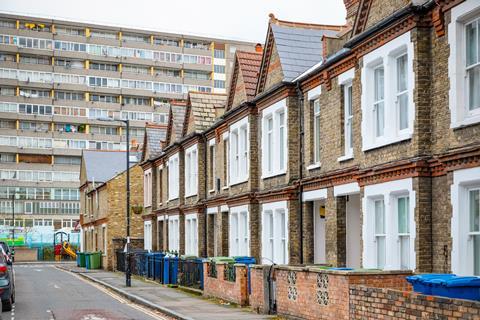Call issued as £10bn cost of planned Part L upgrade to new homes revealed
A strategy to convert the UK’s 27 million homes from their current reliance on fossil fuel-powered heating systems is urgently needed if the UK is to meet climate change targets.

A report from research house Policy Connect found a political vacuum was hindering progress on the huge challenge of swapping millions of gas-powered boilers to low carbon forms of heating in UK homes.
The report comes as the full cost of meeting the government’s proposed revisions to energy rules for new homes emerged.
- Analysis: Future Homes Standard: Up to the job?
Currently, around 13% of total UK emissions come from the heating of homes. The Energy Technologies Institute has previously calculated that homeowners need to switch to low carbon heating systems at the rate of 20,000 a week between 2025 and 2050 if the government is even to meet its previous commitment to reduce emissions by 80%.
The Policy Connect report says a low carbon heat roadmap should be published next year in advance of a full strategy, which it says is “urgently” needed by 2025. It says the government should invest in an “Olympic-style” delivery body to oversee the programme of conversions. The Committee on Climate Change has estimated the annual cost of the necessary programme of conversions at £15bn by 2050.
Polling conducted for the study found that the vast majority of MPs and the public didn’t see reform of heating systems as a priority for climate policy.
Alan Whitehead MP, Labour’s shadow minister for energy and climate change, said the report, which he was involved in commissioning, was a welcome wake up call for politicians, utilities, customers, planners and housebuilders.
He said: “We have just five years to trial and scale new macro and micro solutions for our gas grid and home heating systems to keep costs and carbon down. We all need to work together on long-term policy framework.”
Last month housing secretary Robert Jenrick published details of the government’s proposed upgrade to domestic energy efficiency standards held in Part L of Building regulations, as well as the proposed Future Homes Standard which will apply to homes from 2025. The Future Homes Standard will require all new homes to have low carbon heating pre-installed.
A detailed analysis of the documents by Housing Today shows that the uprating to Part L will cost the housing industry £10.4bn to deliver, generating benefits in terms of lower heating bills which will primarily fall to occupiers. This is equivalent to £4,847 on to the build cost of every new home, delivering a 31% increase in energy efficiency on current build standards.
Brian Berry, chief executive of the Federation of Master Builders, told Housing Today: “It is important for government to be mindful that build costs for SMEs tend to be 70% higher than for volume housebuilders. There is a cumulative impact of all new regulations being introduced for housebuilders over the coming years. Each of these could add thousands of pounds to the cost of a project.”










No comments yet